
The film industry in Germany can be traced back to the late 19th century. German cinema made major technical and artistic contributions to early film, broadcasting and television technology. Babelsberg became a household synonym for the early 20th century film industry in Europe, similar to Hollywood later. Early German and German-speaking filmmakers and actors heavily contributed to early Hollywood.

The Great Dictator is a 1940 American anti-war political satire black comedy written, directed, produced, scored by, and starring British comedian Charlie Chaplin, following the tradition of many of his other films. Having been the only Hollywood filmmaker to continue to make silent films well into the period of sound films, Chaplin made this his first true sound film.

Maximilian Schell was a Swiss actor. He won the Academy Award for Best Actor for the 1961 American film Judgment at Nuremberg, his second acting role in Hollywood. Born in Austria, his parents were involved in the arts and he grew up surrounded by performance and literature. While he was still a child, his family fled to Switzerland in 1938 when Austria was annexed by Nazi Germany, and they settled in Zürich. After World War II ended, Schell took up acting and directing full-time. He appeared in numerous German films, often anti-war, before moving to Hollywood.

István Szabó is a Hungarian film director, screenwriter, and opera director.
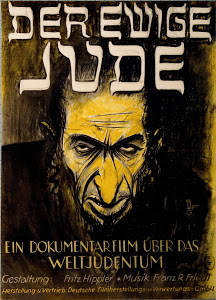
The Eternal Jew is a 1940 antisemitic Nazi propaganda film, presented as a documentary. The film's initial German title was Der ewige Jude, the German term for the character of the "Wandering Jew" in medieval folklore. The film was directed by Fritz Hippler at the insistence of Nazi Germany's Minister of Propaganda, Joseph Goebbels.
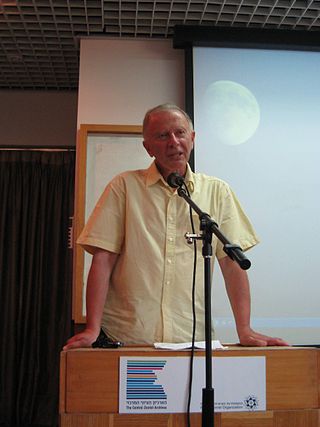
Robert Solomon Wistrich was a scholar of antisemitism, considered one of the world's foremost authorities on antisemitism.

Cinema of Austria refers to the film industry based in Austria. Austria has had an active cinema industry since the early 20th century when it was the Austro-Hungarian Empire, and that has continued to the present day. Producer Sascha Kolowrat-Krakowsky, producer-director-writer Luise Kolm and the Austro-Hungarian directors Michael Curtiz and Alexander Korda were among the pioneers of early Austrian cinema. Several Austrian directors pursued careers in Weimar Germany and later in the United States, among them Fritz Lang, G. W. Pabst, Josef von Sternberg, Billy Wilder, Fred Zinnemann, and Otto Preminger.

Franciska Gaal was a Hungarian cabaret artist and film actress of Jewish heritage. Gaal starred in a popular series of European romantic comedies during the 1930s. After attracting interest in Hollywood she moved there and made three films.
Joseph Ignatius Breen was an American film censor with the Motion Picture Producers and Distributors of America who applied the Hays Code to film production.
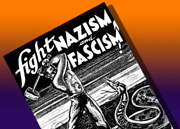
They Were Not Silent is a documentary about the Jewish Labor Committee's anti-Nazi movement in the United States before, during and after World War II. The film features rare archival footage and photographs along with interviews with labor veterans, Holocaust survivors and scholars. It explores how international Jewry worked to help Jews and non-Jews in Germany, Poland, and elsewhere in Europe.
The JLC's role has changed over the years. A trade unionist who has focused on JLC history, Kenneth Burt, says he hopes that the documentary will encourage new interest in the organization.
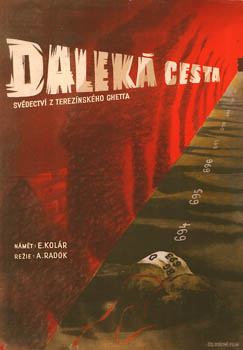
Distant Journey is a Czech Holocaust film directed by Alfréd Radok and released in 1949, not long after World War II. Radok uses experimental cinematography, blending historic footage of the Nazis with a fictional love story between a Jewish woman and her Gentile husband.
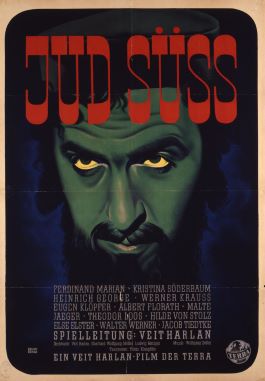
Jud Süß is a 1940 Nazi German historical drama and propaganda film produced by Terra Film at the behest of Joseph Goebbels. It is considered one of the most antisemitic films of all time. The film was directed by Veit Harlan, who wrote the screenplay with Eberhard Wolfgang Möller and Ludwig Metzger. The leading roles were played by Ferdinand Marian and Harlan's wife Kristina Söderbaum; Werner Krauss and Heinrich George played key supporting roles.
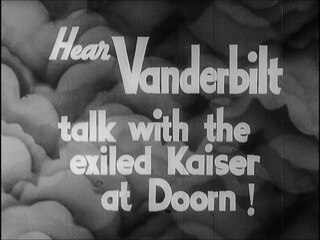
Hitler's Reign of Terror is an independently released 1934 film that attacked the activities of Adolf Hitler in Nazi Germany, and is often credited as being the "first-ever American anti-Nazi film." The film is a combination of newsreel footage, documentary, and reenactment. Despite the fact that the New York State Censor Board refused the film a license, it played for two weeks in New York City theaters which filled to capacity. In Chicago the film was only released after the title was changed to Hitler Reigns to placate the German government. Mordaunt Hall gave the film a negative review in The New York Times when it was released. Film Daily scoffed at the film for its prediction that Hitler's Germany was a future threat to world peace.
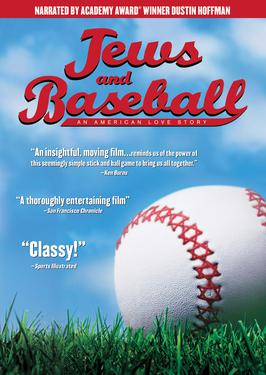
Jews and Baseball: An American Love Story is a 2010 American documentary film narrated by Academy Award-winner Dustin Hoffman, written by Pulitzer Prize-winner Ira Berkow, and directed by award-winning documentary filmmaker Peter Miller. It is about the connection and history between American Jews and baseball.

Imaginary Witness: Hollywood and the Holocaust is a 2004 documentary film directed by Daniel Anker and narrated by Gene Hackman that examines the treatment of the Holocaust in Hollywood films over a period of sixty years and the impact of the films on public perception and thinking, and vice versa. The film was originally produced for the American cable network, American Movie Classics.
Das häßliche Mädchen is a German comedy film made in early 1933, during the transition from the Weimar Republic to Nazi Germany, and premièred in September that year. It was the first or second film directed by Hermann Kosterlitz, who left Germany before the film was completed and later worked in the United States under the name Henry Koster, and the last German film in which Dolly Haas appeared; she also later emigrated to the US. A Nazi-led riot broke out at the première to protest the male lead, Max Hansen, who was supposedly "too Jewish." The film's representation of the "ugly girl" as an outsider has been described as a metaphorical way to explore the outsider existence of Jews.

Karl Pfeifer was an Austrian journalist.

The Munich International Film Festival is the largest summer film festival in Germany and second only in size and importance to the Berlinale. It has been held annually since 1983 and takes place in late-June/early-July. The latest festival was held from June 23 to July 2, 2022. It presents feature films and feature-length documentaries. The festival is also proud of the role it plays in discovering talented and innovative young filmmakers. With the exception of retrospectives, tributes and homages, all of the films screened are German premieres and many are European and world premieres. There are a dozen competitions with prizes worth over €250,000 which are donated by the festival's major sponsors and partners.

When Jews Were Funny is a 2013 Canadian documentary comedy film, directed by Alan Zweig. It was produced by Jesse Ikeman and Jeff Glickman for Sudden Storm Entertainment. The film features two dozen interviews with a variety of Jewish comedy professionals in North America and explores the role of Jewish humour in the context of North American comedy. The filmmaker asks whether earlier generations of Jews were funnier than the present generation and, if so, why. The film becomes more personal as its focus shifts to the filmmaker's desire to reconnect with a culture that has changed.

During a speech at the Reichstag on 30 January 1939, Adolf Hitler threatened "the annihilation of the Jewish race in Europe" in the event of war:
If international finance Jewry inside and outside Europe should succeed in plunging the nations once more into a world war, the result will be not the Bolshevization of the earth and thereby the victory of Jewry, but the annihilation of the Jewish race in Europe.


















